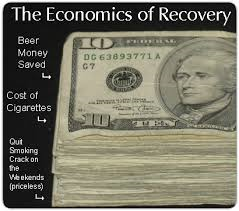NewDay Counseling
If you have a problem with alcohol or some other drug, call a NewDay counselor at 912.201.3605 * 401 Mall Blvd, Ste 101 D, Savannah, Ga * Free Phone Consultations
Addiction and Economics

On a personal level addiction prevents individuals from accomplishing what they could without an addiction problem — this is fairly obvious. Then there’s the societal costs from addiction. Yes, some individuals are successful despite their addiction, but as a rule most people who become addicted to alcohol or some other drug suffer financially and employment-wise. There’s also no way of knowing how much better off even the successful person could become without the addiction. One reason addiction affects the economy, both the personal economy and the larger national economy, is that judgment is impaired. Another reason is health costs due to the physical effects of addiction. Under judgment we can include legal costs. These are the main economic/financial associations that can be tied to addiction.
This chart is from the National Institute on Drug Abuse:

This is a low estimate, because, again, we can’t know what could be. We can only measure the costs, yet how much better off would our economy be if addiction were cut in half? How much more innovation would there be with those clear, energetic minds adding to the productivity of the nation? How many of those healthy people would contribute great things to society? Addiction is a waste of mind, body and spirit, and it negatively affects the economy in ways we can’t even measure. I don’t know how many moderately successful men and women I’ve seen suffering from addiction who were smart and capable enough to do much more. Many of them were fired from their jobs and their reputations were ruined.
On the individual level, it’s a no-brainer that recovery from addiction boosts the chances of the average person succeeding and making a good living, being much more useful to family and society. Of course, recovery is about more than making more money and being more productive, but this is a benefit that’s not discussed as often as it should be discussed. In the beginning, a person starts drinking or using some other drug with the calculation that the highs will be worth any lows. But over time the lows increase and the highs decrease. Like a business that has lost it’s way, there’s often denial, and people continue trying the same thing expecting different results. When the lows are so great they break through the denial, it’s usually when everything has fallen apart. Treatment is about breaking through that denial earlier and realizing what’s ahead if the same actions are continued.
It makes personal sense — it makes economic sense, too.
Recent Comments